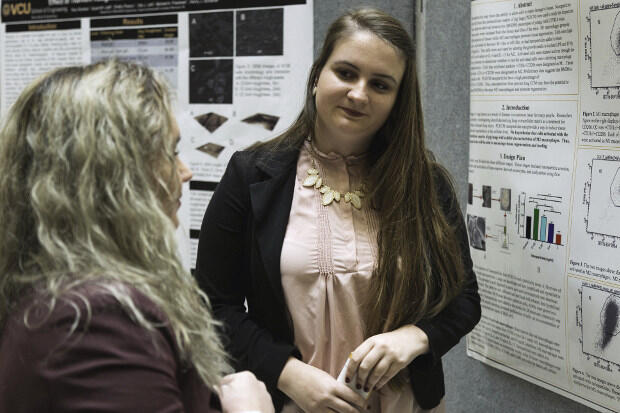
May 31, 2018
Biomedical engineering graduate wins OZY Genius Award
Share this story
Alexandria Ritchie, a 2018 biomedical engineering graduate of the Virginia Commonwealth University College of Engineering, is one of 10 OZY Genius Award winners selected nationally for her idea to develop a pressure-sensing epidural needle device.
Ritchie will win up to $10,000 and be paired with a mentor to take the project to the next level over the summer. This is the third year of the awards that seek to help college students bring their groundbreaking ideas to life. OZY, founded by former CNN/MSNBC anchor Carlos Watson, is a digital publisher that profiles people and technology that are ahead of their time.
To win a national award and find people who want to help us is just very humbling.
“I was very surprised,” said Ritchie, who graduated in May. “To win a national award and find people who want to help us is just very humbling.” She plans to begin a premedical graduate certificate program in the VCU School of Medicine this fall.
In the spring of 2016, Ritchie joined the Engineering Critical Patient Care Team, advised by Bennett Ward, Ph.D., an associate professor in the VCU College of Engineering. The team seeks to improve critical patient care provided by anesthesiologists and nurse anesthetists through various engineered solutions.
“I knew they had a strong relationship with the VCU Health system,” she said. “It was a good way for me to get a sense of what that environment was and what the needs were. Working to find an actual answer to improve the patient experience felt right up my alley.”
The team is one of several in the Vertically Integrated Projects (VIP) program, which allows undergraduate students to work with graduate students and faculty on complex, multidisciplinary research projects over several years. The Engineering Critical Patient Care Team includes members from the Department of Nurse Anesthesia in the College of Health Professions and the School of Nursing. In addition to other biomedical engineering majors, Ritchie’s group included students from mechanical engineering and biology in the College of Humanities and Sciences.
Ritchie volunteered to lead a project to revamp the way an epidural — a common procedure during labor and delivery — is administered. The precise location to deliver epidural anesthesia safely is so small that it is easy to miss, and they are misplaced about 13 percent of the time, Ritchie said. Pushing the needle past the epidural space can result in leaking spinal fluid, headaches and discomfort for the patient.
The first step for the team was learning all they could about epidurals. The engineering students even tried to get a feel for what it was like to deliver an injection by delivering shots to melons, she said.
“We knew we wanted a pressure sensor that could communicate with a microcontroller and display the pressure values,” Ritchie said. The device, called DuraSafe, would provide a visual alert to let an anesthesiologist know when the correct location is reached and the medication could be inserted. During the summer of 2016, Ritchie and fellow biomedical engineering student Aayushi Agarwal worked extensively on the project through a VIP internship. Experimenting with several concepts, the team came up with a final design and developed working prototypes.
Their device, designed to replace the syringe, attaches to the needle and provides visual feedback to the anesthesiologist when the needle has reached the correct location so the clinician can accurately administer the epidural.
This spring, Ritchie’s team also became one of 18 finalists in the pre-accelerator program, called Pre-X, at VCU’s da Vinci Center, which aims to help entrepreneurial students turn promising ideas into viable startup companies.
“It’s a real problem that can be solved,” said Aaron Forrester, a da Vinci Center faculty member who co-led the Pre-X program. The team members were motivated by “a genuine desire to fix something,” he said.
Through the Pre-X program, the group learned about business model development. “As engineers, we did not have a lot of experience — that was a bit of a learning curve for us,” Ritchie said. “At the end of it, we had a full business plan.” The team also gained experience in presenting the idea as a marketable concept.
Ritchie was one of four students given the opportunity to deliver a five-minute pitch to compete for $25,000 in funding at a Demo Day on April 20. Ritchie recalled that she felt nervous before making the presentation. “I didn’t know how well an audience would receive it,” she said.
“She went up and nailed it,” Forrester said, adding that he was impressed by “her willingness to push through in areas that were not necessarily her specialty.”
The result? Of the 18 finalists at Demo Day, Ritchie’s team won the highest amount of funding. The amount has not yet been made public.
Having a business plan also helped when Ritchie applied for an OZY award. During the process, representatives from OZY interviewed Ritchie and asked how she would use the funding and who her ideal mentors would be. This year's judges were Arianna Huffington, founder of The Huffington Post; Neil Blumenthal, a founder of Warby Parker eyeglasses; Karan Khemka, a partner in the Parthenon Group; Aria Finger, CEO of DoSomething.org; and Matthew Mugo Fields, a senior executive at Houghton Mifflin Harcourt.
“I’m tickled,” said Ward, the faculty adviser for the team. “It’s good for her, it’s good for the team. Alex is very driven on this project. It’s a great award for some outstanding work.”
Subscribe to VCU News
Subscribe to VCU News at newsletter.vcu.edu and receive a selection of stories, videos, photos, news clips and event listings in your inbox.








